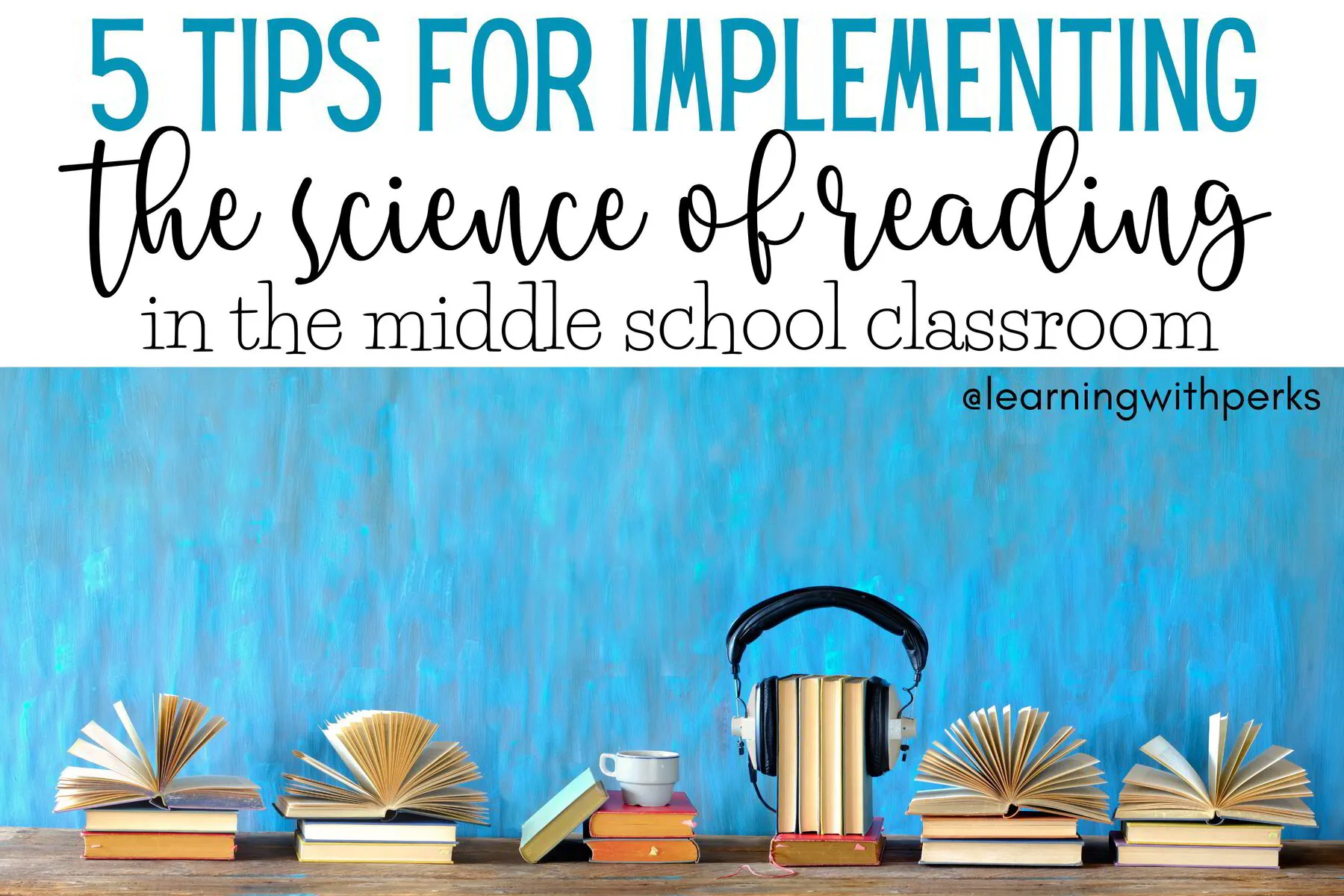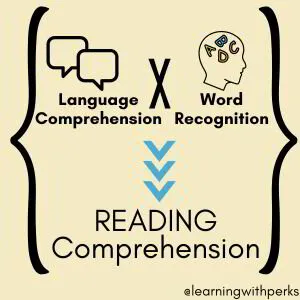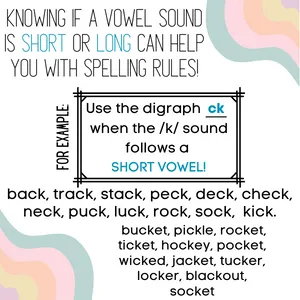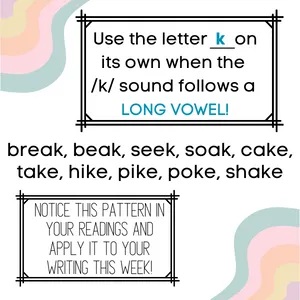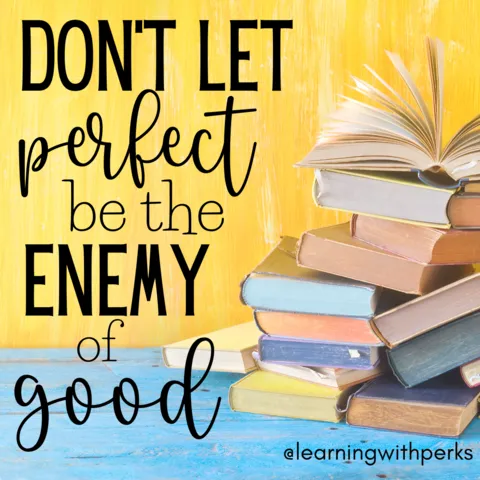1) Reading Comprehension is the ultimate goal - learn about what it takes to have good comprehension.
A great place to start is by studying Scarborough's Reading Rope (CLICK here to learn all about it). I believe that this model holds the answers for many teachers that are wondering how to best teach literacy skills to our older learners.
This simple view of reading formula was presented by Gough and Tunmer in 1986:
Decoding X Language Comprehension = Reading Comprehension
Although it is called the Simple View of Reading... it truly quite complex to reach reading comprehension!
Notice that this is a MULTIPLICATION equation... meaning that if one of the factors is ZERO - the product (reading comprehension) will also be nothing.
Decoding and Language Comprehension skills both must be strong in order to have true reading comprehension. This is something very important to keep in mind as we teach our middle school students! Scarborough's Reading Rope outlines specific sub categories in each of the areas of Word Recognition (decoding) and Language Comprehension:
LANGUAGE COMPREHENSION:
- Background knowledge
- Vocabulary
- Language Structures
- Verbal Reasoning
- Literacy Knowledge
WORD RECOGNITION:
- Phonological Awareness
- Decoding
- Sight Recognition
Keep reading to see a few of the areas from above that you can start with (and maybe already do!) in your classroom.
2) Focus on building background knowledge - this applies to all subjects, not just ELA
Believe it or not, every teacher is a literacy teacher in some way! When you look at the language comprehension side of the reading rope, you can see that those sub categories are essential for other subject areas, like math, science and history. Building background knowledge is a long game - but an important one. The more exposure students have to understanding the topic they are studying, the more they are able to make connections, inferences and visualizations. These are all essential skills for comprehension. TIP - expose students to background knowledge in ways OTHER than reading about a topic! Think: Videos, read aloud, images, discussion.
An amazing site for building background knowledge and comprehension skills is readworks.org - free for teachers to sign up and easy to assign non-fiction articles (and some fiction too!). Audio is available for all readings, so students can focus on high content/knowledge even if they are lower readers. The focus is on the students remembering facts, vocabulary and sharing their knowledge. If you are looking for an independent activity for your classes, definitely check it out!
3) Use rich Vocabulary and talk about language & word structures!
Focusing on vocabulary doesn't just mean looking up the word from a list and copying the definition. Although you may find this helpful for filling student notebooks with study material.... are they truly understanding the words?! Instead, make time in your lessons to talk about the words, their structure, and their connections to other topics. A great place to start is to bring in an awareness of ROOT WORDS, PREFIX and SUFFIX. Do some research prior to teaching the lesson to understand for yourself where these vocabulary words come from and how they are connected to concepts. Here are a few amazing resources to help with this:
https://www.etymonline.com/
{Enter any word and find the original root and meaning behind the word!}
{BEAUTIFUL freebie by Fabio Di Salvo - Root Word Posters for the Classroom!}
IDEA for VOCAB exposure:
Universal Word Study
Word of the Day {bonus: connect this to your content areas!}
- Choose a long word to study each day/week
METEOROLOGIST (for example)
- How can I break it down? (syllables, sounds, prefix/suffix?)
- What is living inside of it? (smaller words? letter patterns? Morphemes? Etymology?)
- Who is in the gang? (ie: other words that end in -ologist? Other words connected to meaning?)
- Connect to subject
- Use in context with intention throughout discussions & lesson
4) Teach mini lessons for spelling rules - use a scope & sequence and word lists!
Spelling/reading rules like the one above can be an excellent way to bring the Word Recognition side of the Reading Rope into your lessons for older students. Although many students can decode in the older grades, I am here to argue that many students S T R U G G L E with spelling! Mini lessons like this hurt nobody, and are essential for some of our learners. My suggestion is to choose a resource that follows a scope and sequence of phonics rules, and teach these lessons in order with a quick & snappy pace - with time throughout the week for a super quick review and practice.
My favourite scope and sequence right now is UFLI - the manual is very low cost compared to many programs, has excellent and simple descriptions of rules and there are TONS of free resources online that match the lessons. Check the UFLI TOOLBOX out here!
Two other great books for teaching spelling/reading rules like this are:
- Uncovering the Logic of English by Denise Eide
- Phonics and Spelling Through Phoneme-Grapheme Mapping by Kathryn E S Grace
Plan a quick 5-10 minute mini lesson, and just try it out! I think you will be surprised at how students respond positively to the spelling rules; I have learned so much myself through implementing mini lessons in my classes!
5) Pick one thing that feels manageable - and just START!
I was recently at a literacy session, and the presenter said this - "Don't let perfect be the enemy of good". I loved this quote. It allowed me the freedom to just pick something that I want to implement, and go for it. The whole program doesn't have to be figured out, the whole year doesn't have to be planned according to the Science of Reading yet... Learning about the science and changing literacy instruction is a long game - and you have to start somewhere! Choose something you can do that is manageable. Start it, reflect on the effectiveness with your class, and build upon it as you go.
YOU GOT THIS!
Let me know in the comments - will you try out any of these tips for beginning to bring the Science of Reading into your middle school classroom? Share this article with teachers and colleagues that teach middle school! Follow on Instagram & Facebook - I would love to connect!

